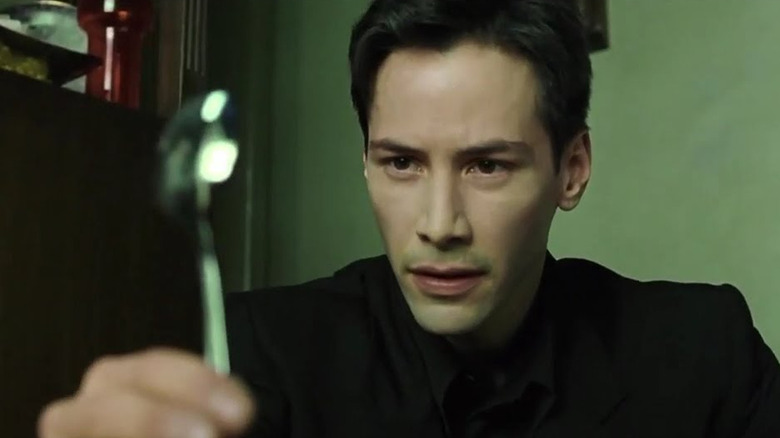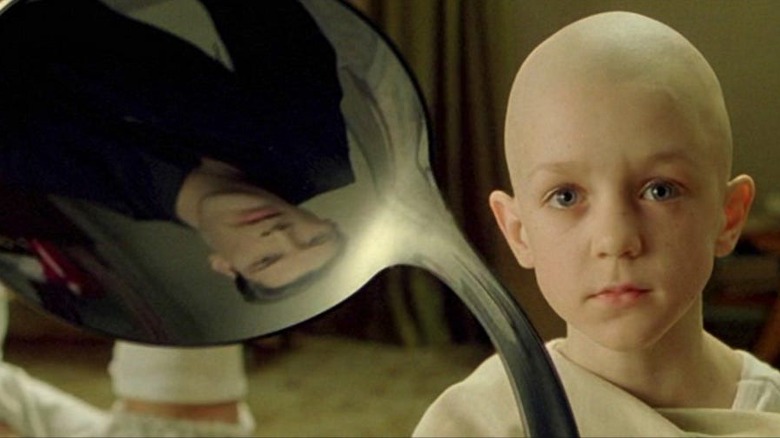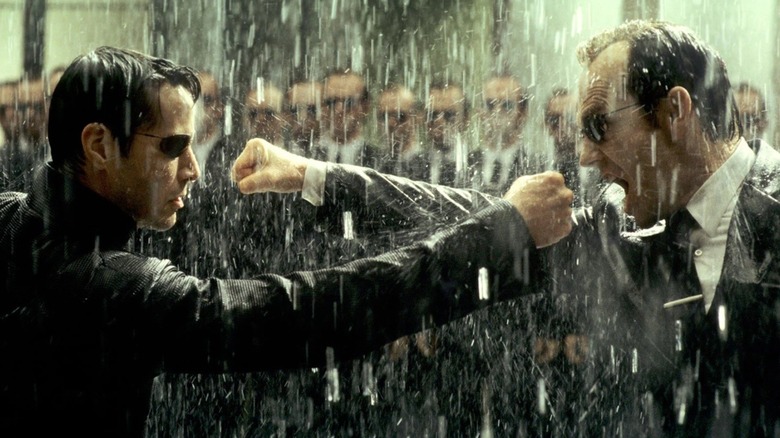The Real Meaning Of 'There Is No Spoon' In The Matrix, Explained
"Do not try and bend the spoon. That's impossible. Instead, only try to realize the truth." Amid many famous lines and memorable moments, none might be more central to the themes of "The Matrix" than this one. When Neo (Keanu Reeves) asks the child (Rowan Witt) in the Oracle's home what "the truth" is, he answers simply, "There is no spoon." After Neo accepts this fact, the boy says, "then you'll see that it is not the spoon that bends, it is only yourself."
The entire Matrix franchise is packed with metaphor, philosophical discourse, and transhumanist themes. It's a story about how people may change with the technology that surrounds us, and also about the immutable traits that will always remain. The spoon scene centers one of the series' core ideas — that your mastery over yourself is the power that can reshape your reality. It's a metaphysical idea, but in the sci-fi world of "The Matrix," where every spoon, car, and other object is nothing more than an amalgamation of code, it's literal. There actually is no spoon in front of Neo, because the world he's holding it in isn't real — or at least, not physical.
In the first movie, the lesson of the spoon is used practically as a tease of Neo's abilities. It's a way to show the audience what he might be able to do once he gets full control of his powers — a promise fulfilled in the film's final act. But in a larger sense, the spoon scene exemplifies the spiritual ideology of the franchise, and particularly its interest in Buddhism.
The Matrix spoon has its basis in real spiritual ideas
At the end of the day, "The Matrix" is a sci-fi action movie inspired by kung fu classics and anime films like "Ghost in the Shell." Its themes, while complex, don't fit perfectly into any real-world spirituality. However, the films do try to create a cohesive ideology by borrowing from various real-world philosophies. The spoon is part of that. Like the white rabbit in "The Matrix," it's both literal and symbolic, thanks to the narrative device of the Matrix itself.
The idea that your control of your mind determines much about your reality is connected to core philosophies of Zen Buddhism. "Right Mindfulness," one step in the Eightfold Path of Buddhism, "accepts everything without judging or reacting," as described in the writings of Buddhist monk Thích Nhất Hạnh. In Buddhist philosophy, it's not so much about controlling your circumstances as it is becoming at peace with your reaction to those circumstances. That said, transformation — the ability to enact change in your life — is also seen in some Buddhist teachings as a part of mindfulness.
The spoon scene can also be read as a more generic "mind over matter" message, which becomes literal in the context of the Matrix. And of course, this idea of mental fortitude and control being the key is central to many martial art disciplines, which the film pulls from throughout.
How the spoon plays into the larger themes of The Matrix
The original Matrix trilogy goes back and forth on the question of self-determination. The first film launches Neo on his adventure after presenting him with a definitive choice — red pill or blue pill. Truth or illusion. This idea of choice, of the power of the self, drives through the entire movie, including the spoon scene. However, "The Matrix Reloaded" counters that idea with the revelation that Neo is merely the latest in a long line of chosen ones. The sequel suggests that past actions and cyclical history determine our reality far more than individual choice. And yet, Neo ultimately rejects this idea, leading to the full-on fight against the machines in "The Matrix Revolutions."
Agent Smith (Hugo Weaving) represents the ultimate rejection of hope and freedom. He believes that since all life ends, and all societies fall, and all things trend toward entropy, there is no point in pitiful human efforts at meaning or independence. This leads to the famous exchange where Smith angrily asks Neo, "Why do you persist?" to which Neo calmly responds, "Because I choose to."
The mere act of choice, of self-direction, holds power, the film seems to say. Even when external circumstances would seem to erase the power of that choice. This idea goes through the whole series, reaching from the spoon scene through the end of the original Matrix trilogy and beyond to "Resurrections." The "bending" of the self, as referred to in the first movie, is the most powerful act because it's the thing that makes us all human.


